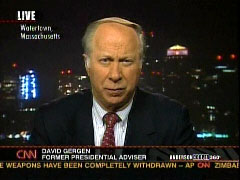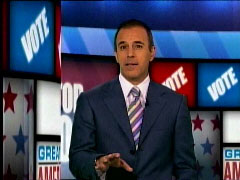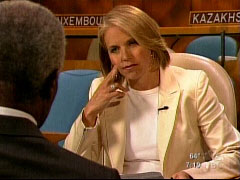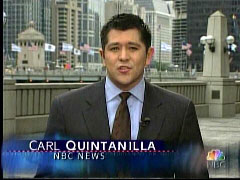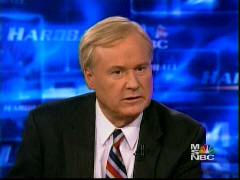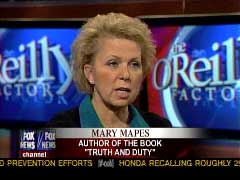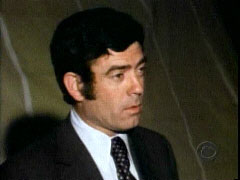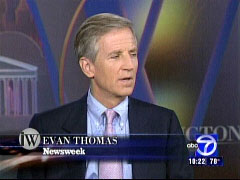
2004
2003
2002
2001
2000
1999
1998
1997
1996
1995
1994
1993
1992
1991
1990
1989
1988






























| <Back |
Page 5 of 7 |
|
| Media Hero Award | |
 "I see her [Hillary Clinton] in — she’s very
consistent [in] what she’s always believed. She’s always had strong
religious faith. She’s been a strong Methodist. She does have conservative
social values on many issues." "I see her [Hillary Clinton] in — she’s very
consistent [in] what she’s always believed. She’s always had strong
religious faith. She’s been a strong Methodist. She does have conservative
social values on many issues."— U.S. News & World Report Editor at Large David Gergen, on CNN’s Anderson Cooper 360, February 9. [71 points] |
|
Runners-up:
|
"Brilliant....Skilled and surprisingly self-destructive.... Despite the
scandals and investigations, Bill Clinton was an incredibly popular
President who connected with the American people....Under Clinton the
economy boomed — deficits turned into surplus — and more than 22 million
jobs were created. Along with the character flaws and the subpoenas came
peace and prosperity." — Matt Lauer assessing Bill Clinton during the June 5 Discovery Channel special, "Greatest American." [63] |
|
"What do you hope your legacy will be?...You literally have the weight of
the world on your shoulders." — Katie Couric’s questions to UN Secretary General Kofi Annan in an interview shown June 7 on NBC’s Today. [45] |
|
Reporter Carl Quintanilla: "[Left-wing activist Cindy] Sheehan, say
some historians, may be evolving as an icon in the war’s turning point, if
this is one. For three weeks, she’s dominated headlines, mobilized
protesters, both with and without relatives in Iraq." Cindy Sheehan: "They don’t have what I like to call skin in the game, but we are all affected." Quintanilla: "Making it safe, her supporters say, to voice doubts about the war, just as Walter Cronkite did on the Evening News in 1968....Historians say we won’t know Cindy Sheehan’s place in the war until the war itself is history." — NBC Nightly News, August 25. [39] |
| What Liberal Media? Award |
 "I’m going out telling the story that I
think is the biggest story of our time: how the right-wing media has become
a partisan propaganda arm of the Republican National Committee. We have an
ideological press that’s interested in the election of Republicans, and a
mainstream press that’s interested in the bottom line. Therefore, we don’t
have a vigilant, independent press whose interest is the American people." "I’m going out telling the story that I
think is the biggest story of our time: how the right-wing media has become
a partisan propaganda arm of the Republican National Committee. We have an
ideological press that’s interested in the election of Republicans, and a
mainstream press that’s interested in the bottom line. Therefore, we don’t
have a vigilant, independent press whose interest is the American people."— Bill Moyers, who retired in December 2004 from the PBS show Now, as quoted by AP television writer Frazier Moore in a December 10, 2004 dispatch. [108 points] |
Runners-up:
|
Host Chris Matthews: "What do you think of this guy [ex-Talon News
reporter Jeff Gannon/James Guckert]? You’re a real reporter. What do you
think of this guy who says he’s a, he operates under a different name. He’s
a blogger, I guess...." Weekly Standard senior writer Stephen Hayes: "Look, at the end of the day, if we’re worried about too many conservatives in the White House press briefing room, this is a discussion that’s not, that’s not going to resonate with the American public." Matthews: "You think it’s mostly packed with liberals? Are you saying most of those people who are paid to be journalists in that room are lib-labs, they’re liberals?" Hayes: "Yes, of course....I don’t think there’s any — is there a debate about that?" Matthews: "Well, there’s Helen Thomas, who I would call liberal. But who else is in there? Seriously. There are a lot of straight reporters in that room." Time’s Margaret Carlson: "I think they’re mostly straight reporters. And I don’t think you can keep your job otherwise....Elisabeth Bumiller reports for the New York Times, which has a liberal editorial page, but she plays it straight down the middle." — Exchange on MSNBC’s Hardball, February 25. [67] |
|
FNC’s Bill O’Reilly: "Now the right wing thinks you’re a raving
liberal, you and Rather contrived to put Bush in the worst possible
light....So are you a liberal?" Fired CBS News producer Mary Mapes: "Well, I’m not sure what a liberal is. I’m more liberal than some people. I can tell you my eight-year-old son thinks he’s being raised by the most conservative parents in the world...." O’Reilly: "Are you registered Democrat?" Mapes: "You know, I don’t know....I don’t know if I’m independent or Democrat. I know I’m not — in Texas, I’m not sure how I’m registered." O’Reilly: "So you would describe yourself politically as?" Mapes: "Oh, my goodness. I’m liberal on some things, I’m conservative on some things." — FNC’s The O’Reilly Factor, November 10. [52] |
|
"One way a reporter in this country should be judged is how well he or
she stands up to the pressure to intimidate. I remember the first time
someone accused me of being an ‘N-lover.’ There was a lot of that during the
‘60s when I covered the civil rights movement. Then you move forward from
civil rights into the Vietnam War....’We’re going to hang a sign around you
which calls you some bad name: anti-military, anti-American, anti-war.’
Then, when Watergate came into being....was the first time I began to hear
this word ‘liberal’ as an epithet thrown my way....People who have very
strong biases of their own, they come at you with a story: ‘If you won’t
report it the way I want it reported, then you’re biased.’ Now, it is true
about me, for better or for worse, if you want to see my neck swell, you
just try to tell me where to line up or what to think and mostly what to
report." — Dan Rather near the end of his CBS News special, Dan Rather: A Reporter Remembers, which aired on his last night as CBS Evening News anchor, March 9. [46] |
| Oh, That Liberal Media! Award | |
 Newsweek Assistant Managing Editor
Evan Thomas: "Is this attack [on public broadcasting’s budget] going to
make NPR a little less liberal?" Newsweek Assistant Managing Editor
Evan Thomas: "Is this attack [on public broadcasting’s budget] going to
make NPR a little less liberal?" NPR legal correspondent Nina Totenberg: "I don’t think we’re liberal to begin with, and I think if you would listen, Evan, you would know that." Thomas: "I do listen to you and you’re not that liberal, but you’re a little bit liberal." Totenberg: "No, I don’t think so. I don’t think that’s a fair criticism, I really don’t — any more than, any more than you would say that Newsweek is liberal." Thomas: "I think Newsweek is a little liberal." — Exchange on Inside Washington, June 26. [81 points] |
|
Runners-up:
"The elephant in the newsroom is our narrowness. Too often, we wear
liberalism on our sleeve and are intolerant of other lifestyles and
opinions....We’re not very subtle about it at this paper: If you work here,
you must be one of us. You must be liberal, progressive, a Democrat. I’ve
been in communal gatherings in The Post, watching election returns,
and have been flabbergasted to see my colleagues cheer unabashedly for the
Democrats."
— Washington Post "Book World" editor Marie Arana in a September
29 contribution to the Post’s "daily in-house electronic critiques,"
as quoted by Post media reporter Howard Kurtz in an October 3
article. [75]
Host Hugh Hewitt: "Are there members of the White House press corps,
Terry, who actually hate Bush?"
ABC White House correspondent Terry Moran: "I would say the answer to
that is yes."
Hewitt: "And what percentage of them, do you think that amounts to?"
Moran: "Uh, small, I would say, but some big fish."
Hewitt: "What’s your guess about the percentage of the White House
press corps that voted for Kerry?"
Moran: "Oh, very high. Very, very high."
Hewitt: "95 percent?"
Moran: "No, I don’t think that high....Upwards of 70 [percent], maybe
higher....I would say very, very high...."
— Exchange on the May 18 Hugh Hewitt Show, a nationally-syndicated
weekday radio program. [55]
| <Back |
Page 5 of 7 |





